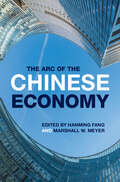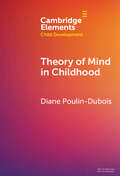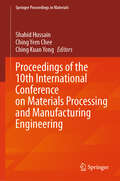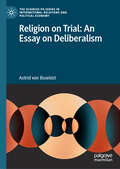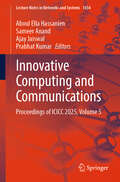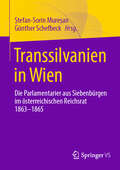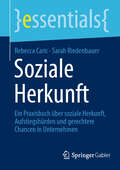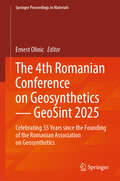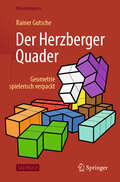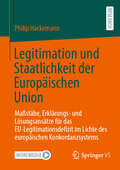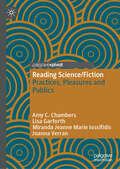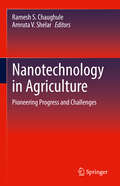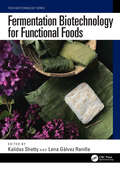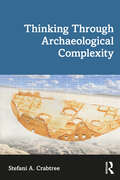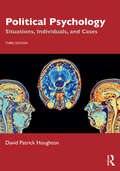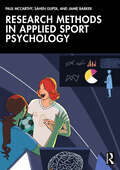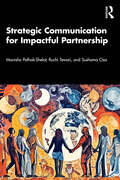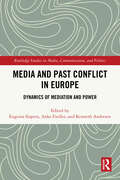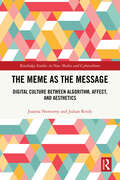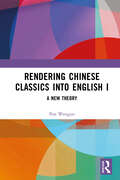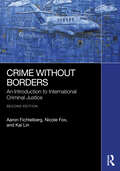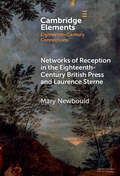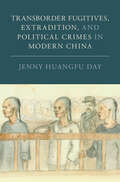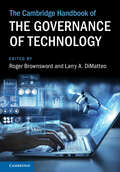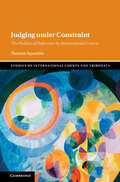- Table View
- List View
The Arc of the Chinese Economy
by Hanming Fang Marshall W. MeyerThis authoritative volume offers a comprehensive exploration of China's rapidly evolving economy from a team of leading specialists. Readers will gain crucial insights into productivity dynamics, innovation, shifting demographics, and the country's ever-changing industrial landscape –encompassing firms, real estate, and trade flows. With a keen focus on the RMB, regulatory frameworks, and the pursuit of common prosperity, this book seamlessly blends cutting-edge research, real-world case studies, and forward-thinking analysis. It delivers a balanced examination of challenges and opportunities, fostering an informed discussion on China's critical role in the global marketplace. Ideal for academics, policymakers, business professionals, and curious readers alike, this timely and accessible resource unveils the many facets of the Chinese economy, guiding you through its complexities and highlighting strategic implications for the future.
Theory of Mind in Childhood (Elements in Child Development)
by Diane Poulin-DuboisThis Element describes the development of a Theory of Mind, or mentalizing, in infancy and early childhood. Theory of Mind is a key social cognitive ability that permits children to predict and explain human behaviors by attributing mental states to other people. Understanding mental states gradually progresses from basic desires to false beliefs. The Element reviews the proximal and distal cognitive and social determinants that facilitate early Theory of Mind development. Discoveries in neuroscience contribute to understanding the ontogeny of Theory of Mind. This Element presents an overview of the main theoretical accounts of Theory of Mind development and offers suggestions for future research.
Proceedings of the 10th International Conference on Materials Processing and Manufacturing Engineering (Springer Proceedings in Materials #91)
by Shahid Hussain Ching Yern Chee Ching Kuan YongThe book presents the selected papers presented at the 10th International Conference on Materials Processing and Manufacturing Engineering on 6-8 September 2024. The book offers an in-depth exploration of advanced materials science and engineering, covering the latest research advancements from material synthesis and characterization to practical applications and innovations in manufacturing processes. Currently, the field of materials science is experiencing rapid development, facing numerous challenges from fundamental research to application translation. For instance, effectively synthesizing nanomaterials with superior performance and accurately characterizing their structural and functional properties are pressing issues in this field. Additionally, the role of materials in various engineering applications, along with the rise of smart manufacturing and sustainable processes, presents new demands and questions for researchers. The purpose of these proceedings is to provide a systematic and comprehensive collection of cutting-edge research findings, helping readers gain a deep understanding of advanced materials' synthesis and characterization methods, and how to apply these materials in practical engineering to improve system performance and sustainability. Through this proceedings collection, researchers, engineers, and professionals can gain the latest knowledge and research results in advanced materials science and engineering, mastering the methods of translating theory into practical applications, thus promoting innovation and progress in their own research and engineering projects.
Religion on Trial: An Essay on Deliberalism (The Sciences Po Series in International Relations and Political Economy)
by Astrid von BusekistThe book deals with three specific encounters between the law and religious commandments: &“separationism&”, &“composition&”, and &“cooperation&” (homeschooling, circumcision, the &“Get-laws&”), and how legal practitioners handle hard cases on a pragmatic basis. Its distinctiveness might me summarized as follows: The book is based on 3 empirical real-life scenarios (see Introduction) involving confrontations between religious commandments and secular law; conflicts between fundamental principles of different normative orders. Instead of asking how the liberal constitutionalism should normatively handle these cases (as the books and articles of my competitors listed below do), I suggest that the threshold between permissible / compatible religious practices is moving and should be treated contextually and pragmatically. My main claim is that there is not one single version of &“secularism&” (or &“laïcité&” in the French context), but a multiplicity of possible dialogues between representatives of faith communities and representatives of the legal / political community. My scenarios show that decisions are guided by a context-specific balance between democratic values, foremost equality and freedom. Sometimes these cardinal values conflict and judges must rank them. The articulation between religion and politics is not stable, not written in advance, not subsumable under a clear rule; legal principles are not hierarchically ordered a priori as all my cases show, even first-order principles (freedom/equality) must sometimes be weighed against each other. I try to theorize each of these pragmatic interactions under the umbrella-concept of &“deliberalism&” and show that my scenarios display three different types of interaction between orders that range from a strong separation to outright cooperation. The counterintuitive dimension of my book is to say that even in a very well-documented field, (Church and state-relations), secularism is not a thick concept, not a theory, but a practice.
Innovative Computing and Communications: Proceedings of ICICC 2025, Volume 5 (Lecture Notes in Networks and Systems #1434)
by Aboul Ella Hassanien Sameer Anand Ajay Jaiswal Prabhat KumarThis book includes high-quality research papers presented at the Eighth International Conference on Innovative Computing and Communication (ICICC 2025), which is held at the Shaheed Sukhdev College of Business Studies, University of Delhi, Delhi, India, on 14–15 February 2025. Introducing the innovative works of scientists, professors, research scholars, students, and industrial experts in the field of computing and communication, the book promotes the transformation of fundamental research into institutional and industrialized research and the conversion of applied exploration into real-time applications.
Transsilvanien in Wien: Die Parlamentarier aus Siebenbürgen im österreichischen Reichsrat 1863-1865
by Ștefan-Sorin Mureșan Günther SchefbeckDieses Buch konzentriert sich auf die politischen Entwicklungen der österreichischen Monarchie in den Jahren 1861-1867, in denen viele Weichen gestellt wurden. Nach dem Scheitern des „Neoabsolutismus“ verfügte das Kaisertum Österreich seit 1861 wieder über ein Parlament, den Reichsrat in Wien. Dessen Funktionsfähigkeit und damit die Wirksamkeit der Reichsverfassung von 1861, die Österreich zur konstitutionellen Monarchie machte, war freilich dadurch beeinträchtigt, dass sich einige Landtage weigerten, Abgeordnete in den Reichsrat zu entsenden. Umso wichtiger erschien es, dass der Siebenbürgische Landtag 1863 seinen Entsendungsbeschluss fasste. Erst dadurch wurde der Reichsrat in die Lage versetzt, seine Zuständigkeit auf die Gesamtmonarchie auszudehnen. Bis 1865 trachteten die Parlamentarier aus Siebenbürgen danach, die Interessen ihres Kronlandes im multiethnischen Reichsrat zu vertreten, ehe das Parlament aufgelöst wurde und die Verhandlungen über den „Ausgleich“ mit Ungarn begannen, der auch der Selbstständigkeit des Kronlandes Siebenbürgen ein Ende setzte. Die Biographien und die parlamentarische Tätigkeit der siebenbürgischen Parlamentarier im Reichsrat (10 Herrenhausmitglieder und 35 Abgeordnete) werden im vorliegenden Buch erstmals systematisch aufgearbeitet.
Soziale Herkunft: Ein Praxisbuch über soziale Herkunft, Aufstiegshürden und gerechtere Chancen in Unternehmen (essentials)
by Rebecca Caric Sarah RiedenbauerDieses essential öffnet die Augen für eine Dimension sozialer Ungleichheit, die im Diversitätsdiskurs bislang kaum beachtet wird. Mit einem klaren Blick auf Strukturen, ungeschriebene Regeln und verfestigte Netzwerke zeigt es, wie soziale Herkunft Karriereverläufe, Aufstiegschancen und Teilhabe in der Unternehmenswelt prägt. Anhand von Analysen, praktischer Beispiele aus österreichischen Unternehmen und Reflexionen über Leistungsmythen und elitäre Systeme lädt dieses essential dazu ein, soziale Herkunft als das zu begreifen, was sie ist: eine entscheidende Größe im Kampf um echte Chancengerechtigkeit in der Arbeitswelt.
The 4th Romanian Conference on Geosynthetics — GeoSint 2025: Celebrating 35 Years since the Founding of the Romanian Association on Geosynthetics (Springer Proceedings in Materials #93)
by Ernest OlinicThis book covers the recent activity of the Romanian Geosynthetics Association which organised three editions of the national symposium GeoSint, in 1998, 2002, and 2007. Continuing in the tradition of previous symposiums, the tradition of this conference is being resumed, this time in a format specific to current times. The Romanian Geosynthetics Association was founded in 1990, the fourth edition of the Romanian Conference on Geosynthetics marking 35 years since its foundation. It was certainly an event with an international opening with 180 participants from 18 countries. The conference was organized in two days (3–4 April 2025) in which published works and six keynote lectures were presented. The scientific committee of the symposium was an international one, made up of specialists in the field.
Der Herzberger Quader: Geometrie spielerisch verpackt
by Rainer GutscheDer Herzberger Quader ist ein räumliches Puzzle aus elf Bausteinen und wurde 1984 von Gerhard Schulze in Herzberg (Elster) vorgestellt. Sein Erfinder sah in ihm zuallererst ein geometrisches Spielzeug. Und genauso wird er im Buch präsentiert: spielerisch, mit Aufgaben, Hintergründen und detaillierten Lösungsansätzen – die Mathematik dahinter bleibt über weite Strecken fast unsichtbar. Neulinge benötigen praktisch keine mathematischen Vorkenntnisse, es werden jedoch auch Fragen aufgeworfen, die selbst Teilnehmende von gymnasialen Leistungskursen als anspruchsvoll empfinden dürften. Damit ist das Buch ebenso bestens geeignet für knobelfreudige Erwachsene, aber auch Lehrkräfte finden vielfältige Anregungen für ihren Unterricht. Im Text befinden sich zwischen ausführlichen Erklärungen immer wieder knifflige Fragestellungen, die Lesende anfangs gern überspringen dürfen. In jedem Fall bietet es sich an, während der Lektüre sowohl einen Herzberger Quader als auch Stift und Papier griffbereit zu haben. Das Buch enthält zahlreiche Aufgaben zum Zusammensetzen verschiedenster Körper und wird durch ein Kapitel über die Geschichte des Herzberger Quaders abgerundet. Die Produktfamilie WissensExpress bietet Ihnen Lehr-, Lern- und Sachbücher in kompakter Form. Die Bücher liefern schnell und verständlich fundiertes Wissen.
Legitimation und Staatlichkeit der Europäischen Union: Maßstäbe, Erklärungs- und Lösungsansätze für das EU-Legitimationsdefizit im Lichte des europäischen Konkordanzsystems
by Philip HackemannIn diesem Buch wird untersucht, inwiefern das vielfach angemahnte Legitimationsdefizit der Europäischen Union womöglich auch woanders begründet liegt als in der einschlägigen Literatur zumeist angenommen: So kommt der Autor zu dem Schluss, dass die EU aufgrund des Ausmaßes ihrer Hoheitsrechte und dem Grad ihrer Verselbstständigung bereits an denselben Legitimationsmaßstäben gemessen werden muss wie staatliche Demokratien. Statt aber auf formal-juristische, institutionelle Feinheiten oder eine vermeintlich ex-ante fehlende europäische Öffentlichkeit und Identität wird ihr Legitimitätsdefizit vielmehr auf ihre mangelhafte Politisierung zurückgeführt. Die EU als solche erfüllt demnach grundsätzlich alle wesentlichen strukturellen Kriterien eines demokratischen Staates (Polity), leidet aber darunter, dass diese bisher nicht mit politischem Leben (Politics) gefüllt wurden. Insbesondere fehlt den Bürgerinnen und Bürgern durch ihre traditionelle Konkordanz- bzw. Konsenspolitik in der Praxis eine echte, sichtbare und glaubhafte Auswahl zwischen Regierung und Opposition. Dies müsste durch eine Mehrheitsdemokratie ersetzt werden, um nicht nur den direkten Einfluss der Bürgerinnen und Bürger zu stärken, sondern auch den Diskurs von schädlichen strukturell-antagonistischen zu konstruktiven inhaltlich-agonistischen Debatten zu verschieben – und damit letztendlich auch eine politische Öffentlichkeit in Europa zu schaffen.
Reading Science/Fiction: Practices, Pleasures and Publics
by Lisa Garforth Amy C. Chambers Miranda Jeanne Iossifidis Joanna VerranThis book explores the relationship between reading science in fiction and engaging with science. Focusing on embodied readers and empirical approaches to fiction reading, the authors examine contemporary social, cultural, biographical and political contexts in which science fictions come to matter. Drawing together a distinctive set of research studies and conceptual resources, the book outlines theories, epistemologies and methodologies for understanding how and why we read science fictions and fictions about science.
Nanotechnology in Agriculture: Pioneering Progress and Challenges
by Ramesh S. Chaughule Amruta V. ShelarThe book discusses nanomaterial interactions with plants and their potential benefits for agriculture. It stands as an authoritative resource for a broad community, describing how Nano formulations of various types of agrochemicals in agriculture are rapidly expanding among the scientific and non-scientific community. The purpose of this book is to provide comprehensive information about the development of synthesis and scaling-up, future scope, current challenges, potential risks assessment and the legal requirements for regulating nanomaterial-based agrochemicals for agricultural sustainability. The book includes the application of Nano chemicals as Nano primers for seed germination, Nano fertilizers to increase crop yields, Nano pesticides for insect pest management, Nano fungicides, Nano herbicides, Nano nutrient, and Nano sensors for tracking crop and soil health conditions, including detecting agrochemicals. In addition, the authors discuss Nano enabled agrochemicals in relation to their toxicological implications in agroecosystems, as well as risk assessment and registration policies for ensuring the safety of nanomaterials used in farming.
Fermentation Biotechnology for Functional Foods (Food Biotechnology Series)
by Kalidas Shetty Lena Gálvez RanillaFermentation-based processing advanced with global food systems as humanity started to organize the domestication of agriculture from plant and animal sources. These advances emerged across regions of the world from river valley civilizations in Asia (Mesopotamia, India and China) and Africa (Egypt) to Meso-American civilizations. As food crops and animal foods emerged from domestication to advancements in post-harvest processing stages, growth of invisible microbial systems led to modified foods that aligned with local palates of the communities. This in several cases became part of food systems, as it added a mode of preservation and improved the food quality that was preferred by each community. This is how the early genesis of fermented foods from grains, fruits and vegetables to animal meats and milk products became an integral part of early civilizations over 4000 years ago and has now carried over and further developed across many countries in every region of the world. The foundations of these food fermentations are now an integral part of modern food advances as preferred food substrates and the microbial interactions that drive the metabolic processes in defined food matrixes are being scientifically advanced.This book focuses on bringing together diverse emergences and advancements of fermented foods across different regions of the world and how the metabolic processes associated with fermentation in several cases add health-relevant functional qualities across different food matrixes. This book contains 26 chapters from the Americas, Africa, Europe and Asia, bringing together the fermentation processes of diverse food substrates and their microbial processing and in several cases providing health-targeted functional benefits.Key Features: Discusses the rationale and basis of fermented food systems from across 26 diverse regions of the world with examples from the Americas, Asia, Europe and Africa Presents historical plant and animal food substrates and the metabolic processes of their fermentation across traditions of a range of countries Covers traditional food fermentations across diverse food substrates that have potentially health-relevant functional benefits Reflects and presents the role of historical, cultural and traditional food concepts of a diverse range of countries with many novel examples and how they have influenced health-relevant functional benefits Discusses the relevance of metabolic concepts of fermented and functional foods in advancing healthy food concepts This book is important for food scientists, nutritionists and the health care sector, but beyond this, it is also relevant for a wider global audience interested in a holistic health approach from food systems where examples of fermentation experience can inform new natural processing strategies to improve food quality and health.
Thinking through Archaeological Complexity
by Stefani A. CrabtreeThinking Through Archaeological Complexity explores how archaeologists can engage with complex adaptive systems, examining dynamic interactions between humans and environments across space and through time. It offers a roadmap for integrating theory, method, and data through a complexity science lens.This volume bridges archaeology and complexity science, offering a transdisciplinary framework for understanding long-term socio-ecological dynamics. It provides a substantive overview of how complex adaptive systems science is used in archaeology. Drawing from case studies in the Ancestral Pueblo Southwest, it demonstrates how tools like agent-based modeling, ecological and social network analysis, and settlement scaling reveal emergent patterns in the archaeological record. The book critically examines concepts such as resilience, adaptation, innovation, and transformation, offering alternatives to overly linear narratives. Emphasizing methodological transparency, it provides practical guidance for scholars interested in modeling, data integration, and working across disciplinary boundaries while grounding in theoretical pluralism. By situating archaeological knowledge within broader scientific conversations, the book encourages readers to reimagine the past not as static or collapsed, but as complex, entangled, and instructive for contemporary challenges.This book is essential reading for students, researchers, and practitioners in archaeology as well as complexity science. It will also appeal to scholars in anthropology, environmental studies, geography, and network science interested in long-term human-environmental dynamics and the application of complex systems approaches in historical contexts.
Political Psychology: Situations, Individuals, and Cases
by David Patrick HoughtonWhat shapes political behavior more: the situations in which individuals find themselves, or the internal psychological makeup—beliefs, values, and so on—of those individuals? This is perhaps the leading division within the psychological study of politics today. Political Psychology: Situations, Individuals, and Cases, 3rd edition, provides a concise, readable, and conceptually organized introduction to the topic of political psychology by examining this very question. Using this situationism—dispositionism framework—which roughly parallels the concerns of social psychology and cognitive neuroscience—this book focuses on such key explanatory mechanisms as emotion, cognition, neuropolitics, genopolitics, personality, beliefs and social identities to explore topics ranging from voting behavior and racism to terrorism and international relations.The new edition is completely revised and contains new chapters to introduce and conclude the book, as well as fundamentally updated material on (for instance) foreign policy decision-making and electoral choice. Houghton has also updated the text to bring us into the era of Donald J. Trump, to pick apart the results of the 2024 US presidential election, and to include up-and-coming research in the areas of neuropolitics and genopolitics. Houghton's clear and engaging examples directly challenge students to place themselves in both real and hypothetical situations which involve intense moral and political dilemmas. This highly readable text will provide students with the conceptual foundation they need to make sense of the rapidly changing and increasingly important field of political psychology.
Research Methods in Applied Sport Psychology
by Paul McCarthy Jamie Barker Sahen GuptaResearch methods (and statistics) underpin much of the work undertaken in applied sport psychology settings and remain at the heart of scholarship in undergraduate and postgraduate courses and professional practice training. Students benefit from learning to understand, synthesise, and critique research in their field of study; however, to learn these skills, they need suitable precepts to guide their learning. This new textbook combines five main areas within applied sport psychology: 1. conceptual issues about science and knowledge; 2. research process (ethics, planning research, etc.); 3. methods (designs, sampling, surveys, interviews, etc.); 4. data analysis (parametric/nonparametric tests, qualitative methods etc.); and 5. reporting research (writing a journal article). Research Methods in Applied Sport Psychology begins with an introduction to conceptual issues within sport and exercise psychology to orient the student about science and knowledge before examining the planning, designing, and starting of research projects. The book then goes on to explore the various methods and issues that arise in research then introduces data analysis for qualitative and quantitative research. This new text, the first to examine research methods specifically for sport psychology is key reading for all sport and exercise psychology undergraduate and post -graduate students as well as invaluable reading for students on sport and exercise science courses who are set to undertake a research project.
Strategic Communication for Impactful Partnership
by Manisha Pathak-Shelat Ruchi Tewari Sushama OzaFoundational to partnership-building, strategic communication can result in meaningful and sustainable social impact. This book offers insights into the significance of strategic communication to nurture and sustain partnerships between the civil society, government, and market by aligning their complementary strengths.Grounded in global research and informed by theory and industry practices, the book provides an in-depth analysis of important aspects critical in building multi-sectoral partnerships. It underlines why successful and sustainable partnerships must be initiated with a clear and shared vision, proper planning, and nurtured with care while employing strategic communication to facilitate the entire process. Through clearly articulated case studies, practical tools and techniques, and adaptable frameworks, the authors demonstrate how communication must be intentionally designed and responsive to evolving contexts and how these tools and strategies can be applied in one’s professional work.This book will be of great interest to researchers, academics, and professionals in communication studies, public relations, organisational communication, governance, public policy and administration, political science, sociology, and business and management studies.
Media and Past Conflict in Europe: Dynamics of Mediation and Power (Routledge Studies in Media, Communication, and Politics)
by Eugenia Siapera Kenneth Andresen Anke FiedlerFocusing on how the history of past conflicts is mediated in the present and recent past in six European countries, this book explores media processes as they intersect with power dynamics and hegemonic narratives of history and historical memory.The analysis centers around six countries that have experienced past conflict and traumatic past histories–Bosnia and Herzegovina, Cyprus, Germany, Greece, Ireland, and Kosovo–selected based on the type of conflict (emanating from WWII, authoritarian past, colonial past, interethnic conflict, or communist past) and its ongoing relevance. Focusing on the mediation of past conflict, the book revolves around the following questions: How do countries that have gone through historical trauma mediate this troubled past? How do they navigate processes of production, representation, and reception? How do journalists negotiate the competing demands of professional values, political tensions, and the emotional fallout of conflict and trauma? How do audiences/publics engage with content that may misrepresent their community or experiences? How do representations of past conflict change over time? How are the mediations of the past involved in present-day politics?Setting out in each chapter the implications of their analysis for journalistic education and practice, the book will attract readers among academics in the area of media and conflict and media and memory; students of media, communications, and journalism; and journalists who write on past conflict and commemoration, as well as those writing and researching on the six countries that form the case studies.
The Meme as the Message: Digital Culture Between Algorithm, Affect, and Aesthetics (Routledge Studies in New Media and Cyberculture)
by Joanna Nowotny Julian ReidyThis book sheds light on the phenomenon of memes, covering everything from pandemic humour to far-right propaganda, from feminist memes to algorithmic censorship. Memes are far more than light entertainment - they are complex cultural artefacts that play a role in politics, in art, and in platform economics.Taking a cultural studies perspective, the authors analyse individual memes in entertaining case studies, systematising their findings in order to redefine this digital form of communication. Chapters connect memes with other digital phenomena such as trolling, and combine extensive close readings of exemplary individual memes with regards to form and aesthetics with an acute awareness of power dynamics and other context phenomena surrounding memes. The book develops an innovative theoretical approach that presents the term “memesis” to capture the very specific quality of meme production and reception as a form of collective creative rewriting of a template in accordance with algorithmic logic.Offering an important contribution not only to the still young field of meme studies but also to the general negotiations of questions around digital literacy, this book will interest not only scholars and students of digital media, visual communication, cultural studies, and media and politics but anyone with a keen interest in digital culture - and how it shapes our lives.
Rendering Chinese Classics into English I: A New Theory
by Pan WenguoThis first volume of a three-volume encyclopedic set explores Chinese–English translation through Chinese cultural perspectives and modern translation theories.The volume provides essential context for the translation of Chinese classics while offering new insights into cultural translation. It covers three key areas: traditional Chinese cultural systems and their core principles, modern approaches to translating Chinese culture, and specialized theories for translating Chinese classics – including their cultural context, necessity, and theoretical foundations.This work will serve as an invaluable resource for scholars and students of Chinese–English translation and Chinese studies seeking practical guidance on translation methodology, as well as for translators working with classical Chinese texts.
Crime Without Borders: An Introduction to International Criminal Justice
by Aaron Fichtelberg Kai Lin Nicole FoxThis book introduces students to the challenges related to international crime and punishment and the ways that criminal justice systems have sought to confront them. The dismantling and opening up of borders by technology, transportation, international trade, and the global flow of labor and capital have allowed those engaging in criminal behavior to work across borders in ways that challenge the traditional nation-state and its criminal justice system, making the study of international crime and justice increasingly relevant. This book not only covers the nuts and bolts of international crime and law enforcement but also raises abstract, theoretical issues for debate and asks critical questions about the ideal ways to think about international criminal justice problems. Contemporary topics such as war crimes, genocide, crimes against humanity, terrorism, drug smuggling, human trafficking, financial crimes, environmental crimes, and cybercrime are addressed, and connections between globalization, politics, and criminal justice reflect the modern realities of international and transnational crime. Following an introductory chapter that presents the dimensions of international criminal justice, the text is organized into two major parts, the first part discussing major international crimes and why people engage in them, and the second part laying out the central structures of the international criminal justice system, including international courts, transnational law enforcement, and aspects of United States criminal justice developed to deal with international crimes. Throughout the book, the authors place global crime within the context of contemporary politics and current events. Pedagogical tools such as summaries of significant international cases, discussion questions, and a thorough bibliography aid reader engagement and understanding. This text is suitable for students in global criminology, international crime, and comparative criminology courses, and researchers and policy-makers concerned with international and transnational crime.
Networks of Reception in the Eighteenth-Century British Press and Laurence Sterne (Elements in Eighteenth-Century Connections)
by Mary NewbouldCriticism and creativity characterised literary reception in eighteenth-century Britain. The press – periodicals, newspapers, and magazines – harboured the reviewing cultures belonging to the emerging professionalisation of literary criticism. It also provided highly fertile ground for creativity, including imitative items inspired by new publications, while critical reviews often incorporated parody. The press fostered experimentation among often anonymous reader-contributors, even while it facilitated the establishment of 'classic' works by recirculating well-known authors' names. Laurence Sterne's reception was energetically shaped by the interaction between critical and creative responses: the press played a major role in forging his status as an 'inimitable' author of note.
Transborder Fugitives, Extradition, and Political Crimes in Modern China (Studies in Legal History)
by Jenny Huangfu DayUncovering a series of landmark but often overlooked extradition cases between China and foreign powers from the 1860s to the 1920s, this study challenges the prevailing conception that political crimes in China were solely a domestic phenomenon. Extradition and extraterritoriality played an important role in shaping laws and regulations related to political crimes in modern China. China's inability to secure reciprocal extradition treaties was historically rooted in the legacy of extraterritoriality and semi-colonialism. Jenny Huangfu Day illustrates how the fugitive rendition clauses in the Opium War treaties evolved into informal extradition procedures and describes how the practice of fugitive rendition changed from the late Qing to Republican China. Readers will gain an understanding of the interaction between international law, diplomacy, and municipal laws in the jurisdiction of political crimes in modern China, allowing Chinese legal history to be brought into conversation with transnational legal scholarship.
The Cambridge Handbook of the Governance of Technology (Cambridge Law Handbooks)
by Roger Brownsword Larry A. DiMatteoIn recent years, the use of AI has skyrocketed. The introduction of widely available generative AI, such as ChatGPT, has reinvigorated concerns for harm caused to users. Yet so far government bodies and scholarly literature have failed to determine a governance structure to minimize the risks associated with AI and big data. Despite the recent consensus among tech companies and governments that AI needs to be regulated, there has been no agreement regarding what a framework of functional AI governance should look like. This volume assesses the role of law in governing AI applications in society. While exploring the intersection of law and technology, it argues that getting the mix of AI governance structures correct-both inside and outside of the law-while balancing the importance of innovation with risks to human dignity and democratic values, is one of the most important legal-social determination of our times.
Judging under Constraint: The Politics of Deference by International Courts (Studies on International Courts and Tribunals)
by Theresa SquatritoAs international courts have risen in prominence, policymakers, practitioners and scholars observe variation in judicial deference. Sometimes international courts defer, whereby they accept a state's exercise of authority, and other times not. Differences can be seen in case outcomes, legal interpretation and reasoning, and remedial orders. How can we explain variation in deference? This book examines deference by international courts, offering a novel theoretical account. It argues that deference is explained by a court's strategic space, which is structured by formal independence, seen as a dimension of institutional design, and state preferences. An empirical analysis built on original data of the East African Court of Justice, Caribbean Court of Justice, and African Court of Human and Peoples' Rights demonstrates that robust safeguards to independence and politically fragmented memberships lend legitimacy to courts and make collective state resistance infeasible, combining to minimize deference. Persuasive argumentation and public legitimation also enable nondeference.
